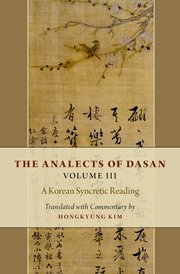Translation Project: Dasan's Analects by Dr. Hongkyung Kim
 A major research and translation project on Dasan Jeong Yak-yong's extensive writing
on the Analects was launched in 2013 with the support from the Academy of Korean
Studies in Korea. The project plans to publish Dasan's extensive work on the Analects in six
volumes. Volumes I, II and III have come out until 2018 through the Oxford University
Press and the rest three volumes plan to be published by 2022.
A major research and translation project on Dasan Jeong Yak-yong's extensive writing
on the Analects was launched in 2013 with the support from the Academy of Korean
Studies in Korea. The project plans to publish Dasan's extensive work on the Analects in six
volumes. Volumes I, II and III have come out until 2018 through the Oxford University
Press and the rest three volumes plan to be published by 2022.
The object of extensive research and creative interpretations, Dasan’s Old and New Commentaries of the Analects (Noneo gogeumju: 論語古今註) has been regarded, by Korean Studies scholars, as a crystallization of his studies on the Confucian classics. Dasan (Jeong Yakyong: 1762-1836) attempted through this book to synthesize and advance the long scholarly tradition of classical studies on the Analects. His work not only represents one of the greatest achievements of Korean Confucianism, but proves also to be one of the most groundbreaking works among all Confucian legacies in East Asia, as it opened the way for progress in Confucian philosophy. Originally consisting of forty volumes, the Old and New Commentaries of the Analects contains one hundred and seventy-five new interpretations of the Analects, hundreds of “questions” about the neo-Confucian commentaries, hundreds of references to scholarly works on the Analects, thousands of quotations from various East Asian classics to support the author’s arguments, and hundreds of philological discussions. Another intriguing aspect of the Old and New Commentaries of the Analects is that, during his exile, Dasan delved into then contemporary studies on the Analects, both those of the Philological Studies in Qing China and the School of Ancient Learning in Tokugawa Japan. This project of translating the Old and New Commentaries of the Analects in its entirety into English—in six books, approximately three hundred fifty pages each, tentatively titled The Analects of Dasan – A Korean Synthetic Reading of the Analects—will undoubtedly contribute to the promotion of Korean Studies by revealing Dasan’s scholarship to the larger academic world and will provide the opportunity to publish the most substantial volume of the Analects in English ever.
